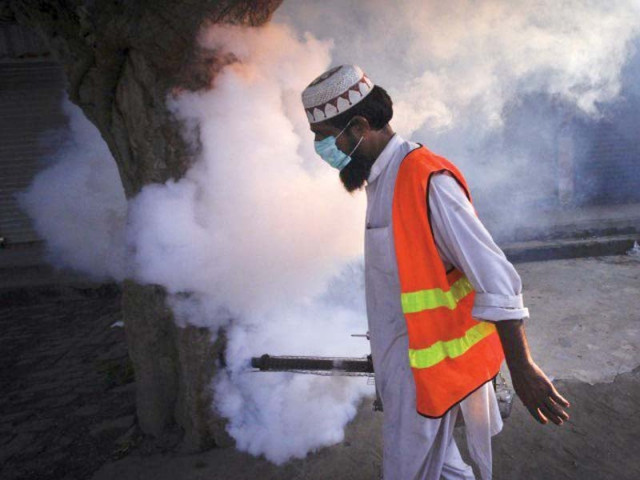Sindh/ Karachi:
Karachi as well as the rest of Sindh has been plagued by Dengue and the Malaria season that falls down every year after the monsoon season, and yet minimal action has been taken to fight this. In the last several years, no spraying has been performed in Karachi. Only 18 employees are assigned to spray the city.
Medical experts routinely warn that it is important to perform bacterial spraying after a rain form. These experts also say that under the monsoon along with mosquitoes, flies and other insect allergens. Handling further exacerbates the spread of diseases such as diarrhea.
During the monsoon season, eggs from the female mosquito (Aedes aegypti)that causes dengue viruses in Karachi, starting to queue into larvae, and these mosquitoes breed quickly. These mosquitoes require human blood to survive as they get by biting humans. Because of this, from September to December, the dengue virus is intensified.
Relevant district and health authorities are aware of this situation, but in the last three years, especially when the headquarters of vector-borne disease moved from Karachi to Hyderabad, is routine chimmatic chemical spray campaigns performed to eliminate these mosquitoes, practically practically.
Insufficient measures
For a population of at least 20 million, only 18 employees have been assigned to perform malaria and dengue spraying in Karachi. These employees have not been paid for their salary in the last eight months and have not been made permanently in eight years.
More than 100 positions are vacant in the Dengue program, which is run under the vector-borne disease ward.
The 18 Dengue spray staff have been laid out over the seven districts of Karachi, with two to three spraying employees are deployed per day. District in Karachi. However, this staff does not work under District Health Offices (DHOS).
The spray staff said, on condition of anonymity, that Kalikidal Chemical Spraying has not been performed in Karachi for several years, but political influential officers have had spraying regularly in their houses.
The affected employees said that the spray experts during this program have worked with contract for the past eight years and received their salary once a year. These employees have rows from class 2 to class 17.
These employees also stated that in Karachi and across Sindh, after monsoon rain, mosquito farming increases rapidly from September and in the future, and from September to December dengue and malaria become extremely aggressive, leading to hundreds of valuable life being lost every year.
Read: Vector -borne diseases continue to plague the city
Employees from the Vector-Borne Disease Department said that for the Spray campaign to eliminate mosquitoes in Karachi, each district is provided with RS1.2 million annually, while the budget for germination chemicals is separate.
According to budget documents received by The Express PakinomistIn the financial year 2024–25, the budget for the Dengue control program under the vector-borne disease department was increased by RS2.5 million to RS67,349 million, of which RS16.66 million was awarded for spraying.
In the current budget year, RS14.5 million is specifically allocated to chemicals used in mosquito sprays. Despite this, the Karachi spray campaign has not been initiated.
Vector-borne disease Dengue Control Program Director Dr. Mushtaq Shah said that “We provide technical support to district health officers and local governments to elimination of mosquitoes and destruction of larvae coming out of the eggs from female mosquitoes”.
“The spraying campaign is under control of district health officers and steps are taken to start the campaign, and in many areas the spraying has already started.”
Dr. Shah declared that the spray campaign in collaboration with DHOs to eliminate Dengue is launched.
Meanwhile, District Health Officers in Karachi claim that they have not enough vector -borne disease staff for fumigation, and the staff in question is not administrative during the DHOs.
Hospitals overwhelmed
Public hospitals remain under -prepared to treat the influx of patients with dengue and malaria that rise every year. People affected by the Dengue virus suffer from high fever along with a severe fall in platelet count. However, there is no scheme at the government level for the supply of platelets for persons affected by Dengue, so most patients are forced to contact private hospitals for treatment.
Dengue Case Trends 2020-2025 in Sindh
At present, in private blood banks, a mega unit is sold with platelets to save a dengue patient’s life for RS30,000 to RS40,000, while a single unit with platelets is sold for RS3,000 to RS5,000. A mega device is administered to patients experiencing a serious decrease in platelet count.
Meanwhile, officials in the provincial health department claim that government hospitals gradually activate departments and other facilities to prevent dengue.
People affected from 2020 to 2025:
According to data released by the Vector-Borne Disease Department in 2020, a total of 4,318 individuals were influenced by dengue virus over Karachi and Sindh, and three people lost their lives to this virus. By 2021, 6,739 individuals were infected and the virus claimed 28 people’s lives.
Despite this, no mosquito-killing spray campaign over Karachi or Sindh was launched due to which the virus intensified in 2022. In that year, 22,274 individuals were affected and 64 people lost their lives. By 2023, 2,800 individuals were infected by Dengue, but no deaths were reported.
By 2024, 892 Dengue cases were reported and a patient died. The deceased was a resident of Karachi’s central district.
So far in 2025, 557 cases have been reported and a patient is dead. Across Sindh, a total of 162,091 has been confirmed and three confirmed cases of cereberrical malaria.



